Cuninghame Surname Ancestry ResultsOur indexes 1000-1999 include entries for the spelling 'cuninghame'. In the period you have requested, we have the following 86 records (displaying 1 to 10): Single Surname Subscription | | | Buying all 86 results of this search individually would cost £434.00. But you can have free access to all 86 records for a year, to view, to save and print, for £100. Save £334.00. More... |
These sample scans are from the original record. You will get scans of the full pages or articles where the surname you searched for has been found. Your web browser may prevent the sample windows from opening; in this case please change your browser settings to allow pop-up windows from this site. Clergy and benefactors of the bishopric of Moray
(1250-1540)
The mediaeval diocese of Moray comprised the shire of Elgin and Forres (or Moray), Nairnshire, and a large part of the shires of Inverness and Banff, in the sheriffdom of Elgin and Forres (Moray). The cathedral was attacked and burned by the Wolf of Badenoch (Alexander earl of Buchan and lord of Badenoch): but about 1400 an attempt was made to piece together surviving archives into a bishop's register. The Liber Episcopi contains the canons and constitution of the church, and charters relating to episcopal privileges and properties; the Liber Decani is the dean and chapter register. A fair copy of these records, plus later charters and writs, was made in 1540 and is called the Red Book of the Church of Moray. These manuscripts, together with other material to as late as 1623, were collated for the Bannatyne Club and printed in 1837. CUNINGHAME. Cost: £4.00.  | Sample scan, click to enlarge
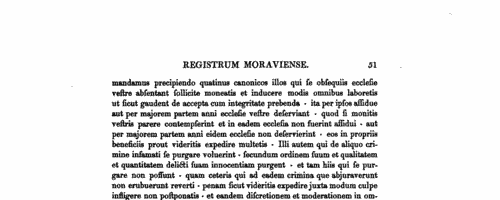
| Scottish litigants, rebels and cautioners: excluded names
(1569-1578)
The Privy Council of Scotland exercised a superior judicial authority in the kingdom, and consequently received and dealt with a constant stream of petitions, as well as dealing with the internal security of the state. This register of the council from July 1569 to June 1578, in the reign of king James VI, was edited by John Hill Burton, Historiographer Royal for Scotland, and published under the direction of the Lord Clerk Register of Scotland in 1878. Some of the individuals mentioned are the complainants, those of whom they complained, and the sureties on both sides: at this period, some of the complainants are alleging serious attacks, often of a feuding nature. Many of the bonds entered into by the cautioners are promises to keep the peace towards such enemies. Failure to answer to the council when summoned was a serious contempt, leading to being denounced a rebel, with serious consequences. But 'horning' was also used in the pursuit of debts: there was no imprisonment for debt in Scotland, but a creditor could have an obstinate debtor ordered, in the sovereign's name, to pay what was due, failing which, the debtor could be put to the horn, denounced as a rebel, and imprisoned as a rebel. In his preface to the first volume, Burton remarked that "There might perhaps be objections to the abundance of names of persons and places unknown to fame; but it was considered that in such a work the proper names of all persons and places occurring in the Register should be preserved, to be at the service of genealogical as well as historical investigators". But by this, second, volume, he decided that complete coverage was impractical, with "the crowding in of proper names, all but a few being the names of obscure persons ... Borderers are called up in considerable groups, and ordered to find, or recorded as having found, sureties for giving compensation to persons plundered, or for good conduct for the future. Several burgesses are sometimes entered in a minute about a Corporation quarrel. When the particulars of unimportant private litigations are omitted, the names remain." He therefore devised this 'Index of Names excluded from the Text', giving name, conditions, and date in register.
CUNINGHAME. Cost: £4.00.  | Sample scan, click to enlarge

| PCC Probates and Administrations
(1646)
The Prerogative Court of Canterbury's main jurisdiction was central and southern England and Wales, as well as over sailors &c dying abroad: these brief abstracts, compiled under the title "Year Books of Probates", and printed in 1906, usually give address, date of probate and name of executor or administrator. They are based on the Probate Act Books, cross-checked with the original wills, from which additional details are, occasionally, added. The original spelling of surnames was retained, but christian and place names have been modernised where necessary.CUNINGHAME. Cost: £2.00.  | Sample scan, click to enlarge
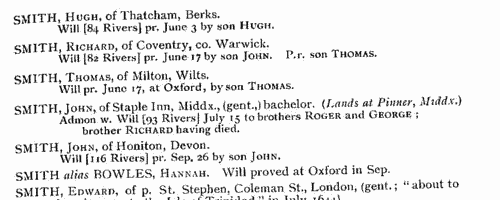
| Darien Company: Edinburgh Subscription List
(1696)
The Company of Scotland Trading to Africa and the Indies was established by Act of Parliament, a general subscription list being opened at Edinburgh from 26 February to 1 August 1696, and a separate one at Glasgow from 5 March to 22 April 1696. These lists were published in 1849 by the Bannatyne Club as an appendix to a volume called The Darien Papers. The lists give date, full name, sometimes an indication of address, and the amount of the subscription, in pounds Scots.CUNINGHAME. Cost: £6.00.  | Sample scan, click to enlarge
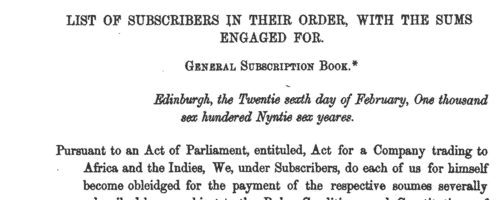
| Darien Company: Glasgow Subscription List
(1696)
The Company of Scotland Trading to Africa and the Indies was established by Act of Parliament, a general subscription list being opened at Edinburgh from 26 February to 1 August 1696, and a separate one at Glasgow from 5 March to 22 April 1696. These lists were published in 1849 by the Bannatyne Club as an appendix to a volume called The Darien Papers. The lists give date, full name, sometimes an indication of address, and the amount of the subscription, in pounds Scots.CUNINGHAME. Cost: £6.00.  | Sample scan, click to enlarge
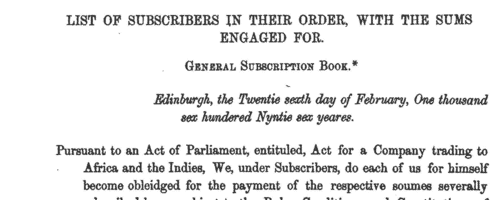
| Treasury Books
(1709)
Records of the Treasury administration in Britain, America and the colonies, for January to December 1709. These abstracts of the Treasury minute books and corresponding warrants for this period covers a huge variety of topics involving all manner of receipts and expenditure, customs and revenue officials, civil servants, pensioners, petitioners and postmasters figuring particularly among the individuals named.
CUNINGHAME. Cost: £4.00.  | Sample scan, click to enlarge
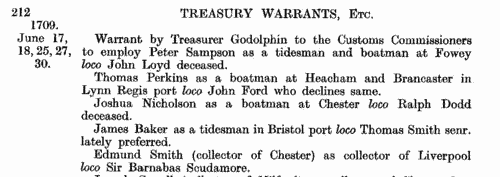
|  Masters of Apprentices registered at Edinburgh
(1710-1712) Masters of Apprentices registered at Edinburgh
(1710-1712)
Apprenticeship indentures and clerks' articles were subject to a 6d or 12d per pound stamp duty: the registers of the payments usually give the master's trade, address, and occupation, and the apprentice's father's name and address, as well as details of the date and length of the apprenticeship. There are central registers for collections of the stamp duty in London, as well as returns from collectors in the provinces. There was a single collection for the whole of Scotland, made in Edinburgh. The sums collected are recorded in Scottish money, with conversion to sterling for transfer to London. A Scottish pund was worth 20 English pence. May 1710 to January 1712. (The sample entry shown on this scan is taken from a Shropshire return)CUNINGHAME. Cost: £8.00.  | Sample scan, click to enlarge

|  Apprentices registered at Edinburgh
(1713-1715) Apprentices registered at Edinburgh
(1713-1715)
Apprenticeship indentures and clerks' articles were subject to a 6d or 12d per pound stamp duty: the registers of the payments usually give the master's trade, address, and occupation, and the apprentice's father's name and address, as well as details of the date and length of the apprenticeship. There are central registers for collections of the stamp duty in London, as well as returns from collectors in the provinces. There was a single collection for the whole of Scotland, made in Edinburgh. The sums collected are recorded in Scottish money, with conversion to sterling for transfer to London. A Scottish pund was worth 20 English pence. July 1713 to April 1715. (The sample entry shown on this scan is taken from a Norfolk return)CUNINGHAME. Cost: £8.00.  | Sample scan, click to enlarge

|  Masters of Apprentices registered at Edinburgh
(1713-1715) Masters of Apprentices registered at Edinburgh
(1713-1715)
Apprenticeship indentures and clerks' articles were subject to a 6d or 12d per pound stamp duty: the registers of the payments usually give the master's trade, address, and occupation, and the apprentice's father's name and address, as well as details of the date and length of the apprenticeship. There are central registers for collections of the stamp duty in London, as well as returns from collectors in the provinces. There was a single collection for the whole of Scotland, made in Edinburgh. The sums collected are recorded in Scottish money, with conversion to sterling for transfer to London. A Scottish pund was worth 20 English pence. July 1713 to April 1715. (The sample entry shown on this scan is taken from a Norfolk return)CUNINGHAME. Cost: £8.00.  | Sample scan, click to enlarge

|  Masters of Apprentices registered in Scotland
(1741-1745) Masters of Apprentices registered in Scotland
(1741-1745)
Apprenticeship indentures and clerks' articles were subject to a 6d or 12d per pound stamp duty: the registers of the payments usually give the master's trade, address, and occupation, and the apprentice's father's name and address, as well as details of the date and length of the apprenticeship. There are central registers for collections of the stamp duty in London, as well as returns from collectors in the provinces and in Scotland. The sums collected are recorded in Scottish money, with conversion to sterling for transfer to London. A Scottish pund was worth 20 English pence. (The sample entry shown on this scan is taken from a Norfolk return)CUNINGHAME. Cost: £8.00.  | Sample scan, click to enlarge

|
Research your ancestry, family history, genealogy and one-name study by direct access to original records and archives indexed by surname.
|













